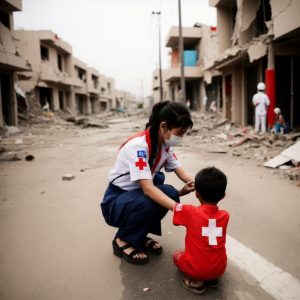In the heart of conflict, where danger is an everyday reality, humanitarian workers stand as symbols of hope and resilience. These brave individuals and organizations operate under perilous conditions in war zones, bringing life-saving aid to those most in need. Whether delivering food, medicine, or shelter to displaced families or ensuring access to clean water, their efforts often come at great personal risk. War zones are fraught with challenges—bombings, armed conflict, and political instability make even basic logistics a monumental task. Yet, humanitarian workers persist, driven by a deep commitment to alleviating suffering and upholding human dignity.
Humanitarian organizations like the International Red Cross, Médecins Sans Frontières (Doctors Without Borders), and the United Nations agencies work tirelessly in these hostile environments. They navigate blockades, secure access through negotiations with warring parties, and often risk their lives to protect vulnerable populations. Their work goes beyond physical aid; it also includes providing psychological support to victims of war and advocating for peace and justice on the global stage. However, the dangers are undeniable—many humanitarian workers have been injured or killed while fulfilling their missions. Yet, they continue, undeterred, because they understand the life-changing impact of their work.
The challenges of operating in war zones also highlight the need for global support and solidarity. Governments, international organizations, and individuals play a vital role in funding and supporting humanitarian efforts. These missions underscore the importance of unity, empathy, and humanity during times of unimaginable hardship. The perseverance of humanitarian workers reminds the world that even in the darkest times, compassion can shine through, offering a lifeline to those caught in the horrors of war.

